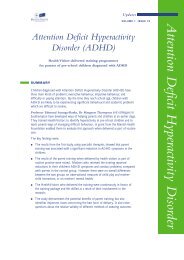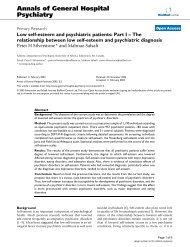are we paying enough attention? - Addiss
are we paying enough attention? - Addiss
are we paying enough attention? - Addiss
- No tags were found...
You also want an ePaper? Increase the reach of your titles
YUMPU automatically turns print PDFs into web optimized ePapers that Google loves.
ADHD: PAYING ENOUGH ATTENTION?A RESEARCH REPORT INVESTIGATING ADHD IN THE UKWhilst ADHD is perceived to be largely a childhood disorder, research suggests that up to 2 out of 3 childrendiagnosed with ADHD (65%) continue to experience symptoms into adulthood. 2“While there is controversy around the prevalence of ADHD, when you put thefigures cited by NICE into real terms, particularly in a school setting, it isclear that these <strong>are</strong> valid. On average, in every school year of 100 children,it is generally found that there is 1 child with severe ADHD and a few morewith less severe symptoms.”Fintan O’Regan, Education Specialist and former Head of the Centre AcademyADHD is a strongly hereditary (or genetic) condition. 1,3 If a family has 1 child with ADHD, there is a30-40% chance that another brother or sister will also have the disorder. 1 If the child with ADHD has anidentical twin, the likelihood that the twin will also have the disorder is about 90%. 1DIAGNOSIS“In the UK, the assessment and diagnosis of ADHD is carried out by specialists.There <strong>are</strong> protocols for these processes and for further management. Althoughsome voices have expressed fears of overdiagnosis and overtreatment, there is noevidence that this is happening nationally. No specialist would want this tohappen and the guidance on good practice that exists will in any case prevent it.”Professor Peter Hill, Consultant Child and Adolescent Psychiatrist at Wimpole Street ClinicIn order to ensure an accurate diagnosis, only specially trained healthc<strong>are</strong> professionals (normally child andadolescent psychiatrists or paediatricians) can officially diagnose ADHD. The methods employed by specialisthealthc<strong>are</strong> professionals in diagnosis <strong>are</strong> robust and a rigorous assessment will be carried out before a diagnosis ofADHD is made. 1 There <strong>are</strong> 2 main medical guidelines which detail the criteria for diagnosis – the AmericanPsychiatric Association DSM-IV 3 (The Diagnostic and Statistical Manual of Mental Disorders) and the World HealthOrganisation ICD-10 (The International Statistical Classification of Diseases and Related Health Problems). 8Diagnosis will also take into account a significant amount of information from other sources, including p<strong>are</strong>nts,teachers, social workers and the GP. Diagnosis of ADHD can be difficult because other problems (such as autism,Asperger’s Syndrome, epilepsy, depression, brain injury or family dysfunction) can result in behaviour similar toADHD. ADHD can exist in conjunction with many other conditions whose symptoms can overlap and mask thoseof ADHD, therefore behaviour due to a separate condition needs to be excluded during diagnosis.Page 4




